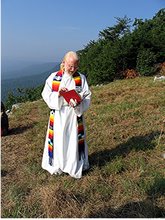
Recently we all witnessed the crashing and burning of the powerful evangelist, Todd Bentley. In reaching for an explanation of what happened to himself, he claimed he was “passing through the Dark Night of the Soul.” Then person in charge of his rehabilitation, Rick Joyner, of Morningstar Ministries, trying to help people understand what was happening, picked up the same term: “the Dark Night of the Soul.”. All of which prompted me to write the following letter: to Joyner,
Dear Rick,
You wrote in your newsletter, that Todd Bentley is suffering the Dark Night of the Soul. The reason I am writing this to you is to say that we in the medical profession, know that wrong diagnoses result in wrong treatments. Our friend is the least likely person I know to suffer what St. John of the Cross means in his classic “Dark Night of the Soul.” If you read on, I will explain.
(At the same time, included in my reason for writing this, is to protect St. John of the Cross’ Dark Night of the Soul from being misunderstood and dummied down. Both Christians and New Agers alike are casually tossing the term around, emptying it of its profundity.)
One of the best ways to approach St. John is to come at him first from other systems of mysticism. What mystics of all faiths have discovered is that, before you can enter the mystic realm, the cognitive system must shut down. In Zen for example, an unsolvable Koan (sound of one hand clapping, etc.) brings the discursive mind (the intellect) to its knees, causing it to flat line. With the discursive mind out of the way, the psyche can enter the mystic realm. In Hinduism, some meditation systems accomplish this state by overloading the discursive processes. Others under load them. Islamic Sufi’s dance and twirl. The outcome is the same. The cognitive processes flat line and the person breaks through into direct encounters of the mystical experience.
St John has given us the Christian way of accomplishing this entrance into the mystic realm. True to our belief system, it is God Himself (not our meditation efforts)Who does the work. He achieves this by challenging the discursive system to the point it accepts that reaching the mystic realm is above its pay grade.
St John includes in the discursive system, the “understanding,” the will,” and “the memory”–all our mental processes except “the intuitive”. He uses the words “soul” and “sense. (I translated “soul” as “psyche”*) St. John writes:
“. . . .it is God Who is now working in the psuche; He binds its interior faculties, and
allows it not to cling to the understanding, nor to have delight in the will, nor to reason
with the memory. For anything that the psuche can do of its own accord at this time serves only, . . . .to hinder inward peace and the work which God is accomplishing . . . . p. 67
Thus, the Dark Night is actually a negative experience only from the point of view of one’s intellect. This darkness is not a pleasant experience for the intellect which believed itself capable understanding everything. St. John explains:
. . . .the Divine wisdom is not only night and darkness for the psuche, but is likewise, affliction and torment . . . because of the height of Divine Wisdom, which transcends the talent of the soul and in this way is darkness to it. p. 100
Most of us have had the experience of our mind hurting when it works on an unsolvable math problem. Most of us are also aware of how our mind annoyingly intrudes into our quiet times with God which it can’t understand. St. John was describing the mental anguish that comes as the mind is being forced to surrender. His fellow monks were straining with every technique they had been taught to reach God. He was teaching them to let go and let God take the mind into darkness. Those who rely on their intellects would never make such a journey.
On the other hand, from the point of view of the entire psychological system, The Dark Night is a positive experience and has a happy outcome.
“When God leads the soul into this night of sense in order to purge the sense of its lower part and to subdue it, unite it and bring it into conformity with the spirit, by setting it in darkness and causing it to cease. . . . He brings it into the night of the spirit, and (although it appears not so to it) the soul gains so many benefits that it holds it to be a happy chance to have escaped from the bonds and restrictions of the senses of its lower self. . . .” p. 74
Of all the people on this planet, Todd is the least likely to be suffering from St. John’s Dark Night of the Soul. More than most people, he has poked through the mental cloud of unknowing into that mystical realm--to paraphrase Star Trek “where no mind has gone before.”
What many who are suffering what they want to call a dark night is more likely what we psychologists diagnose as Dysthymia. Some of the depression can result from an intense overload of emotions which can knock neurotransmitters out of whack.
Another possibility is what I am seeing in all the Charismatic leaders with whom I interact. Agnes Sanford observed years ago, that when the Holy Spirit pours through a person, any glitches will be blasted out into the open. The more powerfully the Spirt moves, the more any blockages can expect to be dislodged. She wrote:“ The subconscious will not peaceably store memories which are contradictory to the nature of God. Attention is constantly drawn back to these unstored memories. If unattended, these memories become problematic.”
As I travel among Charismatic leaders, I see a lot of unexamined pathology. The higher the power of the Spirit works through them, the more these unacknowledged glitches are going to flush up.
So to conclude, please don’t let St. John of the Cross’ great contribution to Christian experience be depreciated.
Sincerely,
Donald L. Clark, EdD, FAACoP
Board Certified Psychologist
Emeritus Professor of Psychology
*(In order to keep any reader from putting his or her own unique meanings into the word “soul,” I have substituted the Greek word ‘psuche” to keep the purity of St. John’s use of the word. In addition, psuche is closer to our word psyche or the psychological system.)
Reference: St. John of the Cross, Dark Night of the Soul, N. Y.: Image Books Doubleday (Translation 1990)
Wednesday, August 30, 2017
NO DARK NIGHT FOR TODD BENTLEY
Posted by
Blogger
at
3:00 AM
2
comments
![]()
Labels: Dark Night of the Soul, Rick Joyner, St. John of the Cross., Todd Bentley
Subscribe to:
Comments (Atom)




